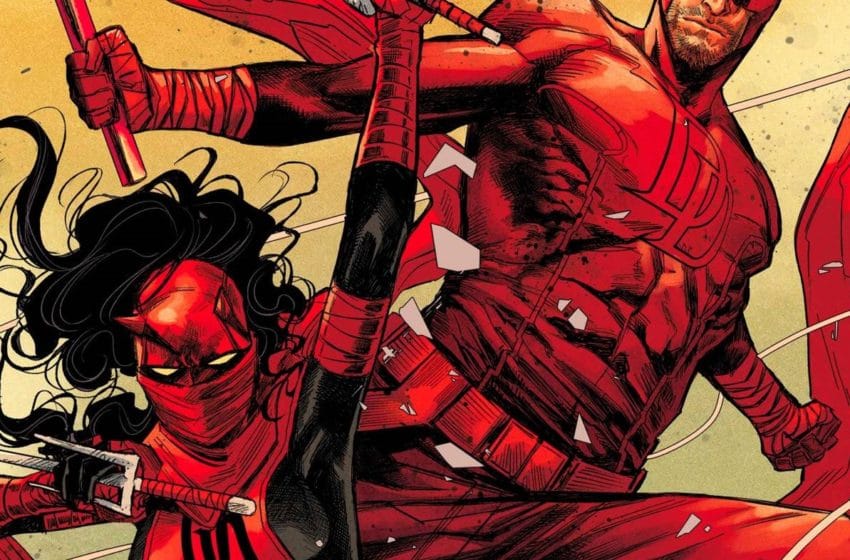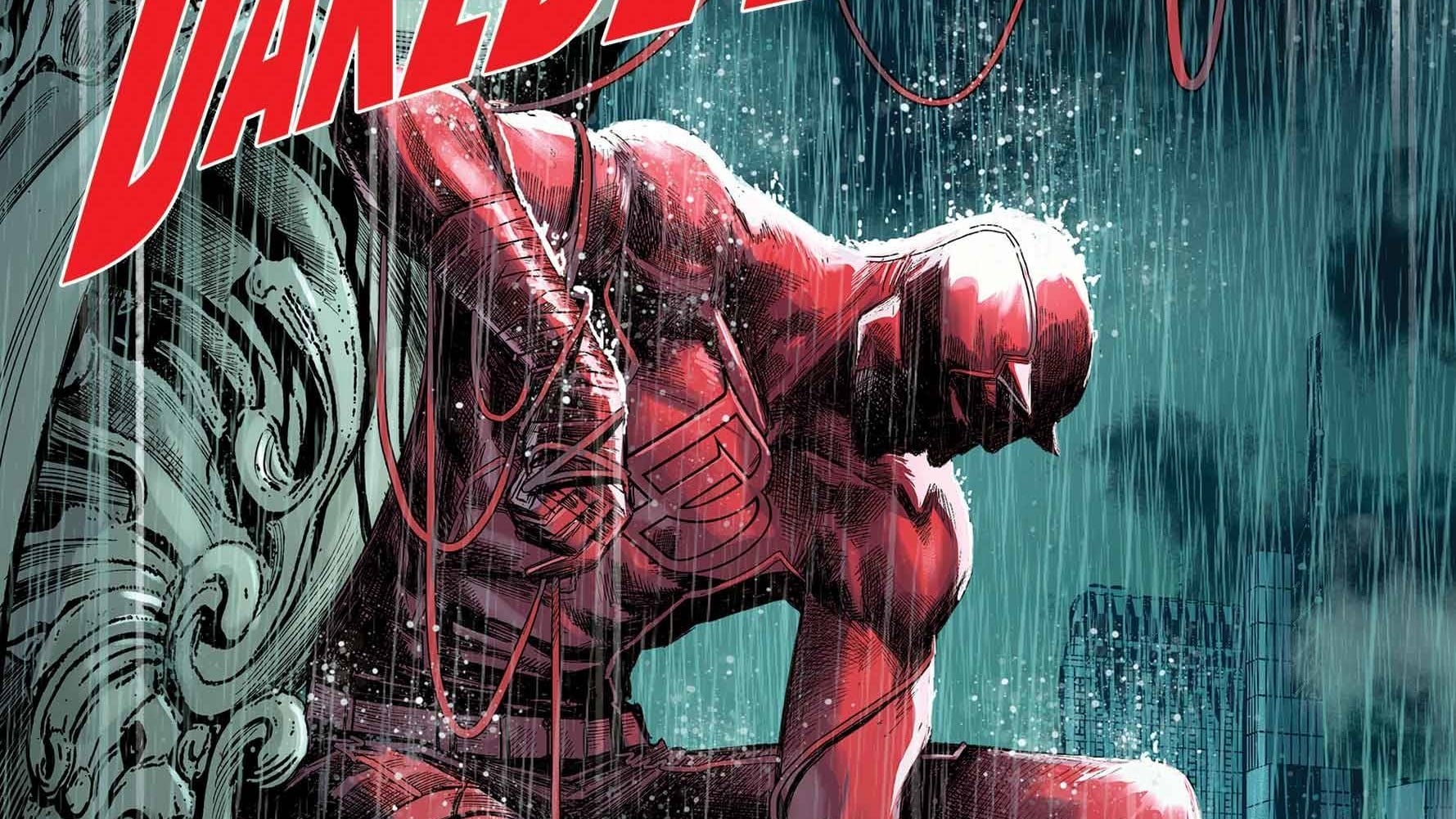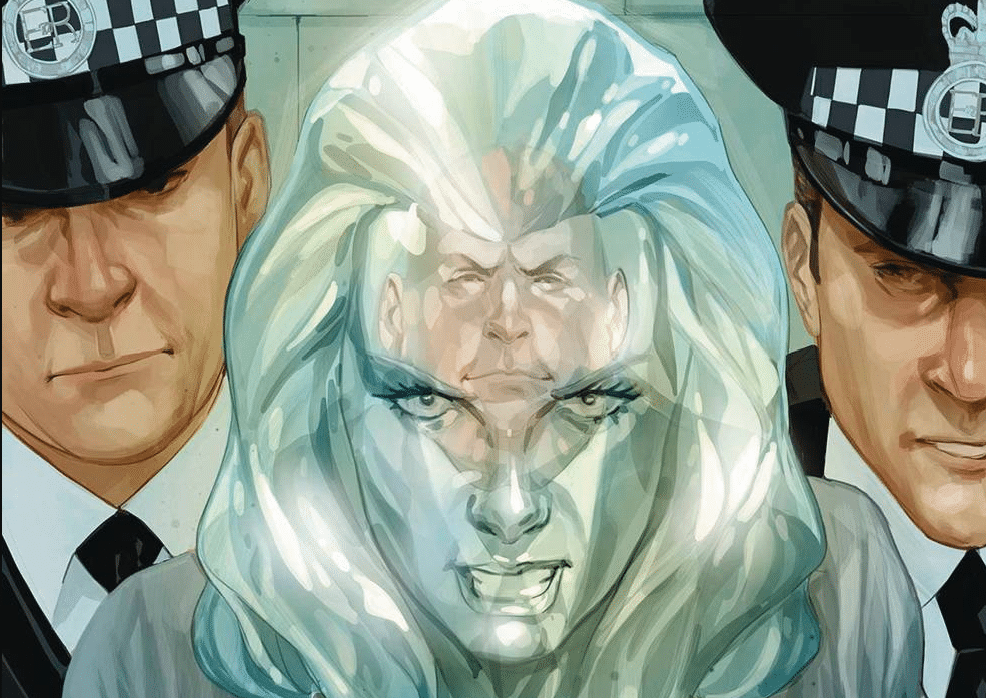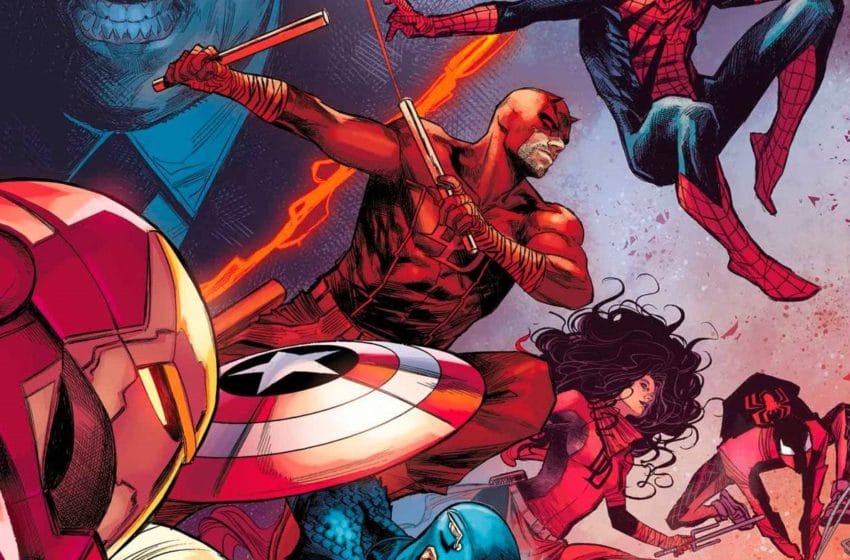Some people get married, others get wet, but everyone’s getting busy in Daredevil #36. Written by Chip Zdarsky, drawn by Manuel Garcia, inked by Cam Smith, Scott Hana, and Victor Nava, colored by Marcio Menyz and Brian Valenza, and lettered by Clayton Cowles, Daredevil #36 is the mega-sized final issue of this volume before we launch into “Devil’s Reign.”
Anna Peppard: Last month, I wrote about how it’s hard reviewing superhero comics, focusing on the challenge of coming up with takes (hot or not) on a single issue of an ongoing—and potentially never-ending—story. I introduced that conversation on purpose, because I had a feeling I wouldn’t know precisely how to feel about the final issue of this series that I haven’t always loved as much as I’ve wanted to, and guess what? I was right! I’m a bushel of mixed feelings about this mostly fine and occasionally better-than-fine issue that aren’t really this issue’s fault. Expectations are sky-high for series conclusions, especially so when your faithful reviewer is deeply invested in the characters whose character arcs she’s reviewing and has strong but not-necessarily-unimpeachable opinions about which types of sex-talk are sexy.
In lieu of making good-or-bad pronouncements, this review is going to talk through those mixed feelings in conversation with the journey this volume had taken us on, reflecting on where it’s been and where it might be headed. I’m also going to talk about the symbolism of getting it on in a river, because that’s a thing that happens in this issue and I am always up for talking about supersex.
But enough foreplay—let’s get to the main event.
The Devil Inside and Out

We open with a TV newscast recap of the events that concluded the last issue, which was a culmination of Daredevil’s increasingly direct approach to problem-solving. As you’ll recall: DD escaped from prison after causing an explosion involving aggression-boosting gas and then briefly becoming the kingpin of said prison while hopped up on said aggression-boosting gas. He specifically escaped for the purpose of fighting Bullseye, not realizing that Elektra—aka the superior Daredevil—already had the situation well in hand. Because Daredevil was an escaped convict doing vigilante violence, the cops tried to arrest him, but DD’s superfriends, including the Fantastic Four, Iron Man, and Spider-Man, stepped up to stop them. The newscast recap informs us that after a brief, tense standoff, Daredevil willingly surrendered to the cops and went back to prison. Which is all well and good, except the standoff has, according to the newscaster, caused the public to question, “Do superheroes believe they’re above the law?”
This isn’t a remotely new question for denizens of the Marvel comics universe, who’ve been actively encouraged to distrust superheroes since J. Jonah Jameson published his first anti-Spider-Man editorial back in 1963. Which brings us to the first batch of those mixed feelings I mentioned. I’m not against stories about the complicated relationship between superheroes, the law, and the non-superpowered public. If I was, I wouldn’t love Marvel comics, because a big chunk of them are about those very things. But I’m not sure about this being the big conclusion of this volume and the main hook for the next story.
I’m accustomed to mainstream serialized superhero comics rarely offering anything beyond the illusion of change, but some illusions are more convincing than others. To his credit, Zdarsky directly acknowledges the repetitiveness of this plot. Later in the issue, Reed Richards is talking to Daredevil and straight-up says, “Nobody wants a repeat of the superhuman registration act.” I feel you, Reed. We all feel you. And yet—here we are.
But the story does move forward in other important ways. Daredevil spends five more weeks in prison before being released into the waiting arms of Foggy Nelson and Kirsten McDuffie. Kirsten affectionately strokes DD’s new beard, but Matt’s got no time for tender touches. Elektra pulls up in a red convertible and Daredevil says, “I need to take this ride.” This is a double entendre.
Born Again

Elektra drives Daredevil to a bridge over a river, parks, and skips down the hill to the water’s edge, discarding her clothes along the way. Matt follows her lead in every sense of the word, stripping just as casually and shamelessly as they discuss things that have nothing to do with why they’re stripping, like Elektra’s reasons for becoming Daredevil and how she managed to remember Matt’s secret identity when the Purple Children succeeded in convincing everyone else to forget.
Elektra says she remembered because she died. That’s fine. But she also says she became Daredevil on Matt’s behalf—because she wanted to prove he could trust her and, less altruistically, because she still wants his help with her latest fight against the Hand. This sits less well with me. I’m glad Elektra hasn’t stopped having her own agenda, and there’s no guarantee she’s being entirely truthful; in fact, being entirely truthful with Matt would be out of character. But the possibility that Elektra became Daredevil to prove herself to Matt isn’t my favorite take. Her story’s always been bound up with Matt’s, but she deserves her own reasons for doing things. Matt’s story isn’t defined by impressing Elektra—why should hers be defined by impressing him? To be fair, the resolution of Elektra’s storyline in the last issue did feel reasonably complex and specific to her. And Daredevil #35 was largely told from Elektra’s perspective, whereas Daredevil #36 is focused on Matt’s. That may account for the shift in emphasis; Elektra could be flattering Matt, telling him what she knows he wants to hear. What happens next suggests she’s good at that.
Elektra and Matt get naked and wade into the river. Sex scenes in mainstream superhero comics are fascinating in part because there’s so much indecision about what you can and can’t show. In this particular scene, we get body hair and scars and side-boob but no nipples, on either Matt or Elektra. Matt’s naked torso is shaded in such a way that his lack of nipples is less jarring, but the side-view, nipple-free silhouette of Elektra’s naked body is very silly. (Free the nipple, Marvel!) Besides that, I like this scene plenty. Matt stripping, following Elektra into the river, kissing her, then claiming he “[needs] to get back to the city,” is pretty great—the very definition of an “in words only” protest that feels in-character for Matt. Elektra tells him to “shh,” declaring, “You’re a new man now. Which means… you need to be baptized.” Not gonna lie—I made a face reading that line. Catholic-themed sex-talk is more of a turn-off than a turn-on for me personally. But Matt seems to enjoy it, and I’m in favor of Matt being happy, so have at it, you crazy kids.
The symbolism of Matt and Elektra having their reunion in a river is as obvious as Elektra’s sex-talk, but obvious isn’t always bad. Matt and Elektra’s love affair is always in motion. It is a decidedly non-domestic relationship, which includes deep feelings but also an embrace of sex for the sake of sex, because they share an appreciation for the spiritual value of sensual pleasures—like the slippery slide and splash of cool water on hot skin.
The Man Without Fear

There’s a lot of plot in this issue, to the point where it’s hard for me to capture it all and still have space to unpack it, but I’ll lay down some rapid-fire summary here. This issue features important developments involving relationships between Butch, Wilson Fisk, Izzy Libris, and Mike Murdock. First: Fisk and Butch have an overdue on-panel conversation. Fisk mentions his other son, The Rose, brought back earlier this year in Amazing Spider-Man: King’s Ransom #1. This son is also the product of magic, meaning Fisk has two magical sons. Some people might feel like this is one too many magical sons, and those people may have a point. But I digress.
In this comic, Fisk’s references to that other son leads to some strong indications he suspects Butch might also be his son; he mentions having a relationship with Butch’s mother and uses fatherly metaphors to manipulate Butch into going after Izzy Libris. Which Butch does; we see him meet up with Izzy in a deserted field, we see him pull out a gun, and we see him drive away, alone, his face cloaked in shadow. But we don’t actually see Izzy get shot. This gap seems deliberate, but time will tell.
We also see Mike grappling with the increasingly inescapable conclusion he’s gotten in over his head. He’s visibly distressed about Butch’s plan to eliminate Izzy, indicating Butch promised him their coup would be bloodless. Mike continues being distressed when he encounters Daredevil, following DD’s sojourn with Elektra. He takes his head out of his hands long enough to ask Daredevil if there’s been any word from Matt. Daredevil offers a simple, cold “no.” A person wouldn’t need super-senses to know there’s something very off about Mike. But Matt’s too focused on his desire to jump out a window to investigate further.
But this issue’s biggest status quo shakeup is the marriage of Fisk and Mary. This is the one part of the story where my mixed feelings become more definitively negative. I’ve discussed my issues with Zdarsky’s writing of Mary several times in this column, and this issue is probably my least favorite depiction to date. There is nothing that’s not stereotypical about Mary in this comic book. Her defining gender and sexual deviance is reduced to modest, bitchy complaints about wedding menus and white dresses (she ends up getting married in purple—her one noticeable rebellion against tradition). When she’s not being a manageably feisty bride-to-be, she’s being a perfect wife, cooking for her man and lovingly canoodling with him and telling him all the love-y things an egotistical man likes to hear. This gender conformity is extreme enough that it’s hard not to suspect it’s a performance, or that Mary has slipped into one of her less rebellious personalities. In the past, her performances of idealized femininity signaled attempts to deny her gendered trauma. I’d like to believe that’s what’s going on here, but there’s little to indicate Mary is anything besides what she appears. A single panel close-up of her face expressing her complex subjectivity would have gone a long way. Instead, her perspective is absent.
Matt similarly erases Mary’s perspective when he discusses Fisk and Mary’s wedding with Elektra, defending his decision to be optimistic about this development. Says Matt: “If [Mary] can make Fisk content… make him want for less… close the book on his greed… maybe that’ll do the trick.” But what does Mary want?
Love & War

And where does this volume leave Matt? I’m not sure what to make of Matt’s interaction with Reed Richards in this issue. Here’s the set-up: in his first outing as Daredevil since getting out of lockup, DD swoops down to intervene in the aftermath of a convenience store robbery. But he doesn’t use violence. When the robber points a gun at him, he simply raises his hands and tells the guy he knows where he’s coming from—that he didn’t just wake up desperate. He calmly takes the gun from the startled robber as he says, “It’s okay. It’s not actually too late.” Then the guy runs away, and Matt lets him, even though the guy still has the money he stole. But Reed Richards, in hardboiled mode judging by the fact he’s thrown a trench coat over his bright blue Fantastic Four onesie, shows up to put a stop to this generosity, violently knocking the robber down with a big stretchy hand and taking the money back.
Daredevil tells Reed the system is broken and that he needs to stop thinking so much about optics and angles and focus on doing what’s right. It’s hard to disagree with that sentiment, but it’s also a fairly vague and juvenile take on social justice. This issue talks a lot about how Matt’s changed. Elektra remarks on it, and so does Matt. And this interaction with the robber and Reed Richards supposedly proves it. But a general lip-service acknowledgement of how the criminal justice system sucks falls well short of the more pointed critique I was hoping this series might offer. Will we ever see Matt’s cellmates again? Or have they been abandoned to the system this series is supposedly criticizing? Again, time will tell.
I also would have liked to see this issue circle back to Matt’s struggle with new physical limitations, a conflict that defined the first part of this volume. Is Matt just… better now? The very visible, very painful scars he sports in this issue suggest otherwise. And of course, Matt retreating into Daredevil is a clear indication he’s got more healing to do. But this retreat into being Daredevil—and specifically, a very un-smiling Daredevil with a heavy masculine beard—also evokes one of the main reasons I haven’t loved this run as much as I want to. This volume has consistently presented a particularly dour, macho version of Matt Murdock. If the character was always been like this, I wouldn’t have fallen for him, because this type of man makes me a wee bit nervous. I remain invested in Matt because of the man he’s been—someone less ashamed of his emotions, whose super-senses inform a physical and spiritual empathy with the people he loves and the city itself. I hope he can find a way back to that version of himself.
Speaking of bringing it back: I’m sure many regular readers of this column have noticed that all the section headings of this review are titles of memorable Daredevil arcs. This reflects my feelings about the plot of this run. This volume has played a lot of Daredevil’s “greatest hits.” That’s not necessarily bad—not when the hits are played well, with skill and feeling. But it is worth noting that this series ends in the same place two memorable Daredevil arcs, Frank Miller and David Mazzucchelli’s Born Again and Brian Michael Bendis and Alex Maleev’s Out, began—with Fiske learning Daredevil’s secret identity.
Granted, Fisk doesn’t actually learn the secret identity here. His file folder labelled “Daredevil Identity” is full of blank photos and newspaper clippings, which is intriguing. The suggestion is, Fisk can’t see the clippings because of the Purple Children’s hypnotism, but the info is there, waiting to be found. The magic-y elements of this run remain one of my favorite things about it; it introduces surreal unpredictability to a world that is, by superhero standards, otherwise pretty grounded. But this doesn’t change the fact that I’ve already read the story of Daredevil being outed. I’ve read it twice, and both times, I enjoyed the stories a lot. But precisely because I enjoyed those stories, I have more of those mixed feelings about revisiting them. Will “Devil’s Reign” succeed in making us see old stories in new ways? If Matt can hope for the best, so can I.
For now—it’s time to say goodbye, or at least see you later. It’s been great chatting Daredevil with you—maybe we can do it again soon!
Marvelous Musings
- I like Manuel Garcia’s art in this issue just fine, but I can’t unsee the Dick Tracy movie version of Littleface in some of these images of Fisk.
- Is it wrong to want more from Mary’s wedding dress? Sure, there are three tiers of purple ruffles, but superhero wedding dresses deserve to be especially rich in symbolic meaning, and this didn’t quite do it for me.
- Elektra is still in costume as Daredevil in the “Devil’s Reign” promo that concludes the issue. This pleases me.
- There’s an interesting assortment of street-level, Marvel Knights-brand characters and more global and galactic-scale characters in the “Devil’s Reign” promo. Daredevil and Elektra haven’t had a ton of interaction with folks like Iron Man and the Fantastic Four over the years. I’m interested to see what comes of that.

Anna Peppard
Anna is a PhD-haver who writes and talks a lot about representations of gender and sexuality in pop culture, for academic books and journals and places like Shelfdust, The Middle Spaces, and The Walrus. She’s the editor of the award-winning anthology Supersex: Sexuality, Fantasy, and the Superhero and co-hosts the podcasts Three Panel Contrast and Oh Gosh, Oh Golly, Oh Wow!





